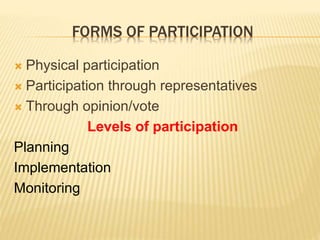Forestry extension
- 1. SOCIAL MOBILIZATION Definition: Social Mobilization is a process in which people are made enable to Discuss their problems, Analyze their problems, make Plans to solve them, Utilize their existing resources, solve them and Sustain it Tools for mobilization Questions Dialogue Trust Firm believe on Human development Humbleness Love
- 2. SOCIAL MOBILIZATION CYCLE Sensitization and Clearance Meetings and obtain permission from authority Meetings with stockholders and contact person Sensitization is not just a formality, must be well planned Counteracting of rumors and false assumptions Awareness Raising Unity Organizing-Puling together different community factions Organizing the community workers Participatory Assessment-Resources, potentials, hindrances and needs Community Action Plan Consistent with community action plan What do we want? What do we have? How do we use what we have? What will happen when we do? Monitoring Evaluation
- 3. ESSENTIALS FOR EFFECTIVE FOREST EXTENSION Mobilization Local support which is achived through Involving religious leaders in communication of messages Involving local leaders of the community Promoting confidence building measures Encouraging indigenous knowledge External support which is achieved by involving technical expert from concerned agencies Training of local caders System management i.e management of all matters
- 4. FACTORS AFFECTING PARTICIPATION Behavior and acceptance of the concerned Deptt Interest of stakeholders Policy of the country Motivation and mobilization of the community Priorities of the community Funds/incentives for participation Law of the country Sufficiency of the forest resources Awareness of the community
- 5. DRIVERS FOR PARTICIPATION Conservation of forest resource for future Involving in the decision making process of their own resources Creation of sense of ownership of the resources Sense of empowerment Expectation of better return from resources in case of best management i.e timber, tourism Improvement in environment Gaining knowledge Capacity building in leadership To prevent corruption by the concerned agencies
- 6. MEASURING PARTICIPATION Participation in plaining i.e preparation of management plans Participation in implementaiton of management plans Participation in monitoring of plans
- 7. FORMS OF PARTICIPATION Physical participation Participation through representatives Through opinion/vote Levels of participation Planning Implementation Monitoring
- 8. INDICATORS FOR PARTICIPATION Stakeholders involvement in planning, implementation and monitoring Participation of stakeholders in protection and conservation of forest resources Awareness of the stakeholders on the current status of the resources Motivation of the stakeholders Level of interest of the stakeholders Participation in afforestation in reforestation Extension of support to the concerned authorities for protection Local measures for protection by stakeholders for protection i.e Awami check post Level of ownership








